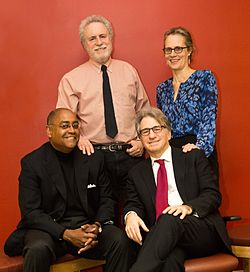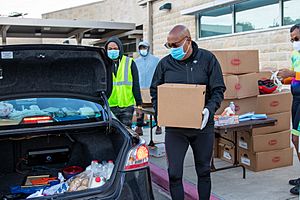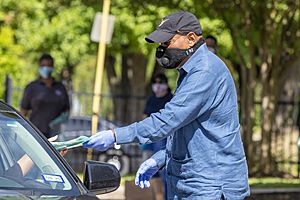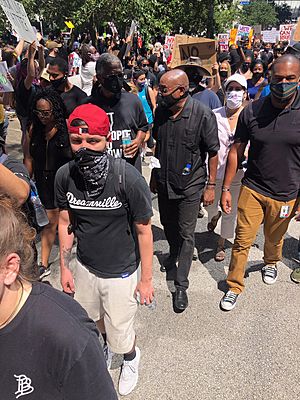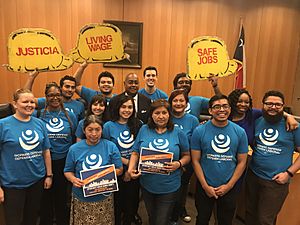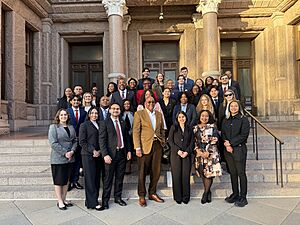Rodney Ellis facts for kids
Quick facts for kids
Rodney Ellis
|
|
|---|---|
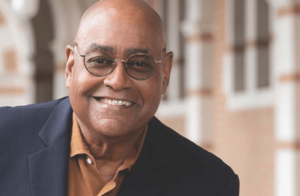
Ellis in 2024
|
|
| Member of the Texas Senate from the 13th district |
|
| In office February 27, 1990 – January 9, 2017 |
|
| Preceded by | Craig Washington |
| Succeeded by | Borris Miles |
| Harris County Commissioner from Precinct 1 | |
| Assumed office January 9, 2017 |
|
| Preceded by | El Franco Lee |
| Member of the Houston City Council from District D | |
| In office January 2, 1983 – December 28, 1988 |
|
| Preceded by | Anthony Hall |
| Succeeded by | Alfred Calloway |
| Personal details | |
| Born | April 7, 1954 Houston, Texas, U.S. |
| Political party | Democratic |
| Spouse |
Licia Green
(m. 1997) |
| Children | 4 |
| Residences | Houston, Texas, U.S. |
| Alma mater | Texas Southern University (BA) University of Texas at Austin (MPA, JD) |
| Profession | Lawyer |
Rodney Glenn Ellis (born April 7, 1954) is an American politician and lawyer. Since 2017, he has served as the Commissioner for Precinct 1 on the Harris County Commissioners Court. He is a member of the Democratic Party.
Before becoming a commissioner, Ellis was a member of the Texas Senate for 26 years, from 1990 to 2017. He represented a district that included parts of Houston and Fort Bend County. During his time as a state senator, he helped pass over 700 laws.
On November 8, 2016, Ellis was elected as the Harris County Commissioner for Precinct 1. He officially began his new role on January 1, 2017.
Contents
Early Life and Schooling
Rodney Ellis grew up in the Sunnyside neighborhood of Houston. He was one of three children. His father worked as a yard man, and his mother was a maid. Both of his parents also worked as health care assistants.
Ellis went to B.H. Grimes Elementary and Carter G. Woodson Middle School. He graduated from Evan E. Worthing High School, where he was the student council president. He first attended Xavier University in Louisiana but later transferred to Texas Southern University. There, he earned a degree in political science.
He continued his education at the University of Texas at Austin. He earned a Master's degree in Public Affairs and a law degree. While in school, he gained experience in government by working for Texas Lieutenant Governor Bill Hobby. He also worked as a law clerk for a judge.
Early Career in Government
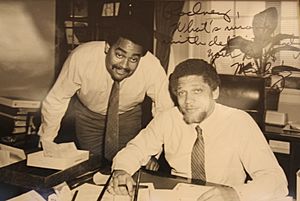
Before becoming a senator, Ellis worked as the chief of staff for U.S. Representative Mickey Leland in Washington, D.C. It was through his work with Congressman Leland that he met his wife, Licia. They married in 1997 and have four children.
In 1983, at age 29, Ellis was elected to the Houston City Council. He served for three terms. As a council member, he worked to tear down abandoned buildings that were unsafe. He also pushed for more money to fight crime and supported community oversight of the police.
Ellis also worked to improve housing for people with low incomes. He helped protect the Allen Parkway Village, a historic housing project. He also fought against apartheid in South Africa by helping convince the University of Houston to stop investing in companies that did business there.
Work in the Texas Senate
As a state senator, Ellis focused on many important issues, including the economy, civil rights, and criminal justice.
Making Life More Affordable
In 1999, Ellis passed a law that created a three-day sales tax holiday. This holiday allows families to buy school clothes and supplies without paying sales tax. This saves Texas shoppers millions of dollars each year.
In 2001, as chair of the Senate Finance Committee, he wrote the state's $113.8 billion budget. This budget increased funding for important services like health care for low-income families, pay raises for state employees, and health insurance for teachers.
Fighting for Civil Rights
Ellis worked to make it easier for people to vote. In 1993, he passed the "Motor Voter" law, which lets people register to vote when they get their driver's license.
In 2001, he authored the James Byrd, Jr. Hate Crimes Act. This law strengthened punishments for crimes motivated by a victim's race, religion, or sexual orientation. It was named after an African American man who was murdered in a brutal hate crime.
In 2009, he helped pass the Free Flow of Information Act. This law protects journalists from being forced to reveal their secret sources. This helps the press stay independent and report the truth.
Improving the Justice System
Ellis is a national leader in criminal justice reform. He has worked to prevent innocent people from being sent to prison. For 14 years, he was the chairman of the Innocence Project, a group that works to free people who were wrongly convicted.
In 2001, he passed the Texas Fair Defense Act. This law made sure that people who cannot afford a lawyer get one appointed to them quickly.
He also passed laws to increase the money paid to people who were wrongly imprisoned. In 2013, he authored the "Michael Morton Act." This law requires prosecutors to share all information with the defense, which helps ensure a fair trial. It is named after a man who spent nearly 25 years in prison for a crime he did not commit.
Helping Students and Schools
In 1999, Ellis created the TEXAS Grant Program. This program gives money for college to high school graduates who have good grades but need financial help. Since it began, the program has helped hundreds of thousands of students attend college.
In 2011, he also helped the University of Houston and other Texas universities work toward becoming Tier One research schools.
Harris County Commissioner
As a Harris County Commissioner, Ellis has continued to work on issues like justice, economic fairness, and community support.
COVID-19 Response
During the COVID-19 pandemic, Ellis led efforts to help residents. He supported creating a relief fund that gave money to families in need. He also voted for programs that offered forgivable loans to small businesses and rental assistance to prevent people from losing their homes.
Justice and Safety
In 2019, Ellis led the effort to change the county's bail system. The old system was found to be unfair to poor people. The new rules allow most people arrested for minor crimes to be released without paying cash bail.
After the death of Houston native George Floyd in 2020, Ellis led the passage of 11 criminal justice reform measures. These included studying a civilian board to review police actions and finding alternatives to sending people to jail.
Economic and Environmental Justice
Ellis has worked to make sure county contracts are awarded fairly to businesses owned by women and minorities. He also created a policy that requires construction workers on county projects to be paid a fair wage.
After Hurricane Harvey, Ellis helped create a $2.5 billion flood bond program. The program prioritizes projects in communities that are most vulnerable to flooding. He has also worked to improve the county's ability to respond to chemical fires and pollution.
Community and Personal Life
In 1990, Ellis founded the Texas Legislative Internship Program (TLIP). This program gives college students the chance to work in the Texas government. It helps them learn about public service firsthand.
Ellis is an avid cyclist and an art collector. As commissioner, he has supported public art projects, including murals and statues that honor important figures and events. He helped place a statue of George Floyd in a county park and a statue of Congressman Mickey Leland in Hermann Park.
He is also leading the creation of the Harris County Remembrance Project Park. This park will be a place for people to reflect on social and racial justice.
See also


